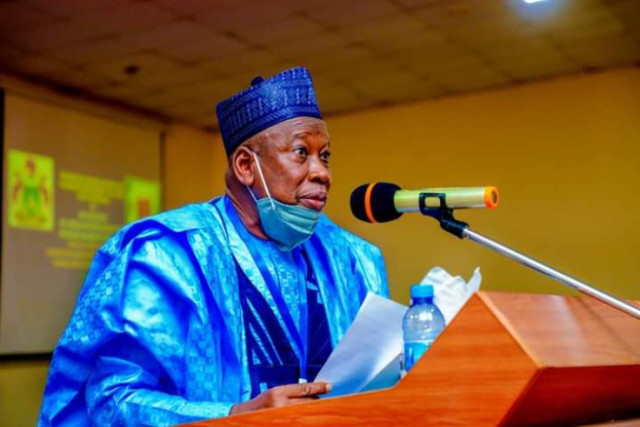The Federal High Court, sitting in Kano, gave a 48-hour ultimatum to two Kano judges, Justice Lawan Adamu and Justice Zuwaira Yusuf, to resign their appointments from the judicial commissions of inquiry set up by the state government.
The two judges were appointed by the Kano State Governor, Abba Yusuf, to serve as chairmen of the two commissions of inquiry to probe the ex-Governor Abdullahi Ganduje’s administration.
Justice Adamu is the chairman of the Judicial Commission of Inquiry for the recovery of misappropriated public properties and assets while Justice Yusuf is the chairperson of the Judicial Commission of Inquiry on political violence and missing persons.
The order was given by Justice Simon Amobeda, while delivering his judgment in the case instituted by Ganduje, praying the court to stop Yusuf from probing his administration.
Justice Amobeda maintained that if the judges failed to comply with the resignation privilege within 48 hours, the National Judicial Council (first defendant) would immediately halt payment of any remuneration, allowances, or benefits from the Federation’s Consolidated Revenue Fund to the judges.
He cautioned them to desist from performing executive functions assigned to them by the governor in courtrooms meant to adjudicate disputes between persons and authorities in the state.
The judge said the action by Yusuf to set up the commissions of inquiry to investigate Ganduje without appealing an earlier court judgment by Justice A. Liman, which declared that Ganduje could only be investigated by the Economic and Financial Crimes Commission or the Independent Corrupt Practices and other Related Offences Commission, amounted to abuse of office and undermining the sanctity of the judiciary.
He said, “That, by the combined provisions of Sections 153(1)(i) of the Constitution of the Federal Republic of Nigeria, 1999, CFRN, 1999 (as altered), Paragraph 21(d) of Part I of the Third Schedule Constitution of the Federal Republic of Nigeria, 1999 (as altered) and sections 1, 3 and 6 of the Commission of Inquiry Law, Cap. 26, Laws of Kano State, the Governor of Kano State has no power to appoint the 4th and 5th defendants and administer another oath of office on them to serve as chairmen of commissions of inquiry constituted by the Governor of Kano State, an office meant for commissioners of Kano State government, in order to exercise executive powers assigned to them by the Governor of Kano State and stop them from performing their functions as judges of the High Court of Kano State, without recourse to the first defendant (NJC).
“That, by the combined effects of the provisions of Sections 6, 84, 153(1)(1), 271(2), 272 together with Paragraph 21(c) of Part 1 of the Third Schedule to the Constitution of the Federal Republic of Nigeria, 1999 (as altered), the 4th and 5th defendants are not legally permitted, while still purporting to hold the office of Judge of High Court of Kano State, to accept appointments as chairmen of commissions of inquiry with quasi-judicial powers equivalent powers to that of a Magistrates’ Court and subject to review by a Judge of the High Court of Kano State.
“That, by the combined effect of Sections 5 and 6 of the Constitution of the Federal Republic of Nigeria, 1999 (as altered), the action of the Governor of Kano State of appointing the 4th and 5th defendants as chairmen of the commissions of inquiry, pursuant to the provision of Sections 3 and 6 of the Commission of Inquiry Law, Cap. 26, Laws of Kano State, instead of appointing from amongst the Commissioners of Kano State Government, is an encroachment into and undermining the judicial arm of government, a breach of the doctrine of the separation of powers, a grave violation of the Constitution, and gross misconduct on the part of the Governor of Kano State and the 3rd Defendant, who administered the oath of office and oath of allegiance to the 4th and 5th defendants."




















